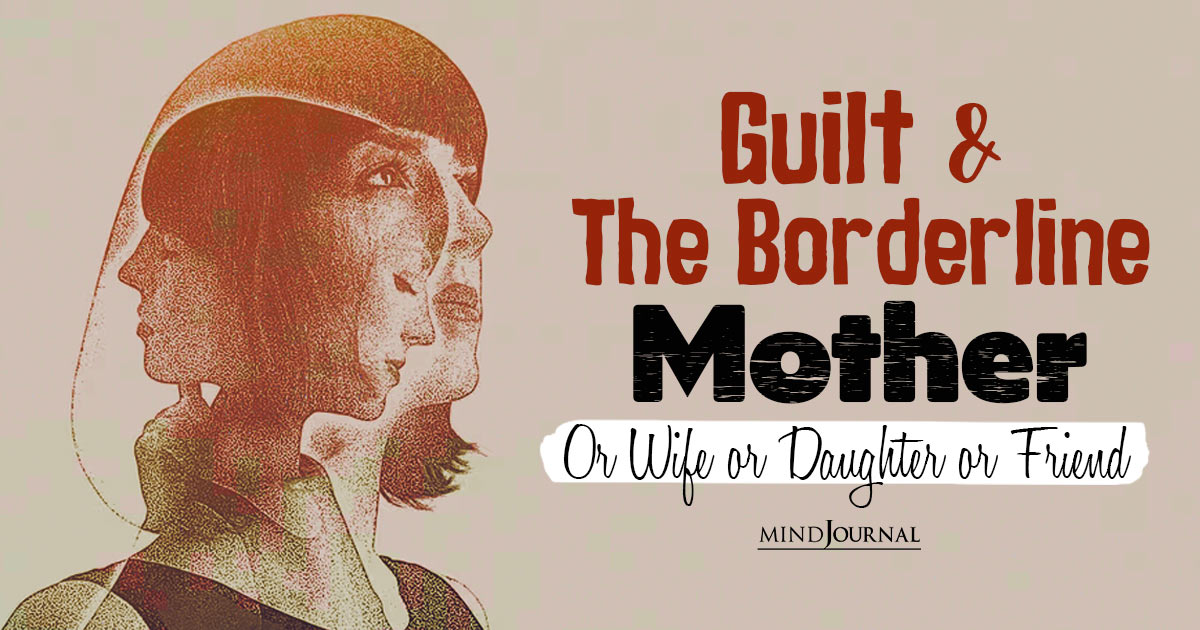Loving someone with borderline personality disorder can feel exhausting sometimes. And then comes the guilt. So what is this connection between borderline personality disorder and the guilt you feel? This article is going to focus on the connection between BPD and guilt, and why you feel the latter.
Your phone rings; you look down and her name appears on your screen. Sadly, you dread clicking over…and then comes the guilt.
Your history with her rushes into your mind as you wait for one more ring. You’re reminded of all the times that you’ve rushed to her side, comforted her, and told her you’d be there for her, while realizing over time that your caring would never be enough to shore up her fragile self-worth.
Or you think of how you’ve watched as she’s made one impulsive choice after another while blaming others, including you, for the chaos of her life. You’ve had to set boundaries against which she constantly pushes, ultimately accusing you of not caring when she senses your fatigue.
Perhaps you’ve heard thinly veiled hints of self-harm, followed by admonitions that she doesn’t know how long she can continue like this. Maybe there are sudden, unexplainable times when you’ve felt that your love for her was reciprocated in an intense, almost intoxicating way.
Related: 7 Most Common Symptoms Of Borderline Personality Disorder (BPD)
Yet almost as quickly as it arrives, that warm glow disappears in a cloud of sudden anger or irrational disappointment.
Even more confusing is that others who know her in the community may adore her. They haven’t a clue how draining a closer relationship can be and would find your reality nearly unbelievable — as she can often be quite popular and well-loved by coworkers, neighbors, and even strangers.
Structure offers her a scaffolding, a role to play, and if she’s the teacher or the supervisor, she can shine. But she lacks the empathy needed for closer, more intimate relationships.
They don’t know she has borderline personality disorder.
No matter who she is, whether she’s your mom, your sister, your partner, your friend… you can become exhausted. Your own guilt can be unrelenting, and she may not have the capacity – and certainly not the insight – into understanding her impact on you or others.

What guilt sounds like inside your head…
“She’s my mother — she raised me the best way she could. I owe her.”
“She’s my daughter… I’ll never forget the day I saw her for the first time. So tiny, so trusting. She deserves the same kind of relationship I have with the other kids.” But you know in your gut she’s different than your other children.
“She’s my wife and I vowed to be there for her. She was different back then; this side of her was hidden. Plus she’s the kids’ mom and in a way, I still love her.”
“Even though she’s my ex, I don’t know how she’d treat the kids if she felt like I wasn’t there for her. She flipped out when we got divorced. I can’t totally abandon her, ever. It’s wreaking havoc between me and my now wife, who, of course, she detests.”
“She was my best friend when no one else would talk to me in eighth grade. She was there, always. So why do I shudder at the thought of simply talking with her now?”
Guilt. Guilt. And more guilt.
The emotional kaleidoscope of borderline personality disorder…
In I Hate You Don’t Leave Me, the classic book on borderline personality disorder, the authors state, “The borderline shifts her personality like a rotating kaleidoscope, rearranging the fragmented glass of her being into different formations… Like a chameleon, (she) transforms herself into any shape that she imagines will please the viewer.”
Her emotions govern all her actions. She’s terrified of abandonment and highly sensitive to not feeling understood.
I suspect I have someone with borderline traits in therapy when, after only after one or two sessions, I hear something along the lines of, “I’ve never felt this understood by anyone before.”
She puts me on a pedestal in order to bond with me, as she tries unconsciously to figure out my own vulnerabilities.
In fact, it can be uncanny how well someone with borderline traits can assess your own internal struggles — and use those very issues to manipulate you.
For example, if you’re someone who takes responsibility for your actions very seriously, she may subtly or not so subtly insinuate you’re falling down on the job or question whether you know what you’re doing.
Not all people with borderline traits threaten suicide consistently or have intense rage reactions. There are several “types,” some who are quieter, less dramatic versions of the disorder, but all cause tremendous problems in intimate relationships.
Related: Raised By A Borderline Mother: Signs, Types, Effects, And How To Deal
Living with borderline personality disorder…
I want to stress this point. Living with an emotional hurricane inside of you day in and day out is no party. Having borderline personality disorder can be an agonizing existence.
There’s often a chaotic and abusive childhood history. Unrecognized and untreated, it can lead to a miserable life, as one by one, she wears out the people who are trying to love or help her.
It is difficult to treat, but there are therapeutic techniques that have been shown to work well, DBT or Dialectical Behavioral Therapy being chief among them.
As someone who’s lived and tried to love someone with this struggle. you can only be responsible for that which you can control. You’ve tried multiple times to get your loved one help — and she stops taking her meds.
Or she gets involved with another bad relationship. Or she won’t return your texts, after she’s threatened suicide one more time. Perhaps she denies she has a problem at all, pointing the finger at you and stating you’re not trying hard enough at the relationship.

9 steps to minimize guilt
In order to let go of the guilt, I’m offering nine concrete steps you can take. They’re simple for me to write, but difficult to do.
- Face the fear of your own helplessness in this relationship by predicting the most feared outcome (most likely suicide or some kind of highly dramatic action) and decide how you would handle it.
- Assess whether or not her capability of physically hurting you is rational. If it is, seek advice from a lawyer or, in an emergency, the mental health emergency services in your area.
- Objectively see the damage caused to you and to other family members. Journal about it and see how your writing and acknowledgment may influence your future actions. try to see your own relationship like you would see someone else’s
- Give her back the responsibility for her own life, knowing she’ll never give you permission to change the relationship. For example, when she calls with another crisis, say, “I know you’ll find a way to cope with this.” And get off the phone.
- Provide empathy but not sympathy. Set up strict boundaries for communication and then be available if she follows those guidelines (Her reaction may initially be to escalate. But give her time.)
- Give her sincere feedback about the positives in the relationship and what you appreciate about her.
- Grieve the relationship that could have been; acknowledge and feel the pain of that loss. Again, journaling can be very helpful here.
Related: Loving Someone With Borderline Personality Disorder
- Realize she may never have the capacity of understanding the impact she’s having on you or your family. She’s not withholding something from you; she’s likely not capable of giving it. So, if you stop expecting that understanding, perhaps you won’t get hurt.
- Get support from others who understand or have walked the same walk.
- And perhaps the most important, have compassion for yourself.
Check out Dr. Margaret’s Tedx Talk on YouTube, and also don’t forget to tune into her beloved podcast, The Self Work Podcast.
Written By Dr. Margaret Rutherford Originally Appeared On Dr. Margaret Rutherford










Leave a Reply